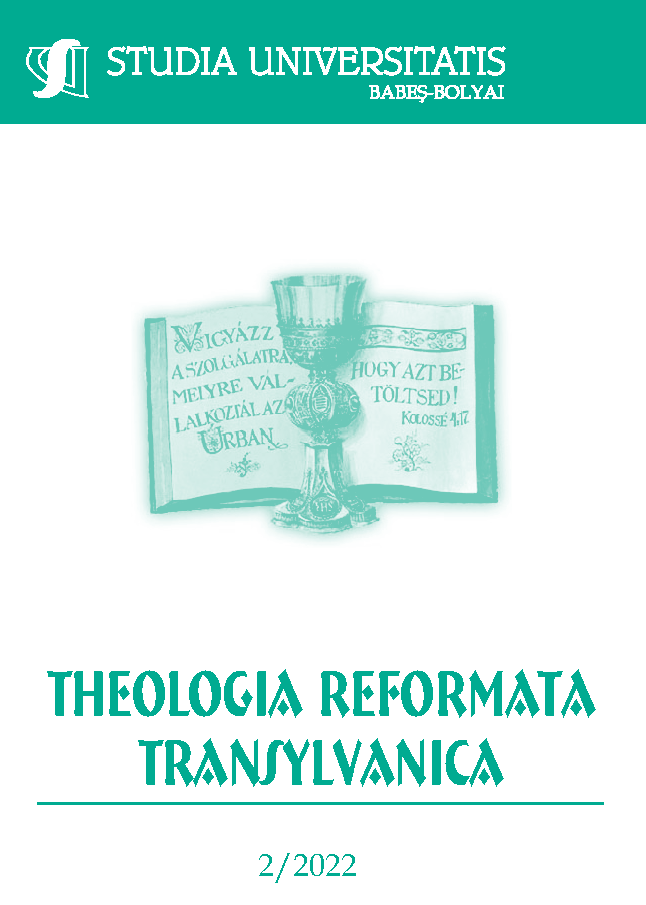Εἰκών bei Paulus
DOI:
https://doi.org/10.24193/subbtref.67.2.01Keywords:
Philo, Paul, image of God, εἰκών and σῶμαAbstract
Εἰκών in Paul. “And God said, Let us make man in our image (ποιήσωμεν ἄνθρωπον κατ ̓ εἰκόνα ἡμετέραν)...” (Gen 1:26). One assumes that this meaningful phrase has left many traces in the New Testament. But if one looks at the occurrence of the word εἰκών, it becomes quite clear that it has a special theological meaning only for Paul. For him, the word expresses the extraordinary dignity of the human being. In my article I would like to explore this theme and compare Paul’s thoughts on εἰκών with Philo’s concept of εἰκών. In my article I would like to discuss the topic in three points. First, we will brief-ly look at the εἰκών motif in Genesis. Then we will see how Philo understood the image of God. And at the end we will arrive to Paul.
References
ALTMANN, Alexander, „Homo Imago Dei” in Jewish and Christian Theology, The Journal of Religion (48:3), 1968, 235–259.
CROUCH, Carly L., Genesis 1:26-7 as a Statement of Humanity’s Divine Parentage, in JThS (61:1), 2010, 1–15.
DUFF, Paul B., Transfomed “From Glory to Glory”: Paul’s Appeal to the Experience of His Readers in 2 Corinthians 3:18, JBL (127:4), 2008, 759–780.
FITZMYER, Joseph A., Romans. A New Translation with Introduction and Commentary, Doubleday, London, 1993.
FORGER, Deborah, Divine Embodiment in Philo von Alexandrien, JSJ (49), 2018, 223–262.
GIELEN, Marlis, Grundzüge paulinischer Anthropologie im Licht des eschatologischen Heilgeschehens in Jesus Christus, in I. Baldermann, E. Dassmann ua. (Hrg.), Menschenwürde, Neukirchener Verlag, Neukirchen-Vluyn, 2001, 117–147.
GOODENOUGH, Erwin R., An Introduction to Philo Judaeus, Basil Blackwell, Oxford, 21962.
GROß, Walter, Gen 1,26.27; 9,6: Statue oder Ebenbild Gottes?, in I. Baldermann, E. Dassmann ua. (Hrg.), Menschenwürde, Neukirchener Verlag, Neukirchen-Vluyn, 2001. (11-38).
JANOWSKI, Bernd, Anthropologie des Alten Testaments, Mohr Siebeck, Tübingen, 2019.
KILNER, John F., Humanity in God’s Image: is the Image really Damaged?, in JETS (53:3), 2010, 601–617.
KOOTEN, George H. van, Paul’s Anthropology in Context, Mohr Siebeck, Tübingen, 2008.
KUHLI, Horst, εἰκών in H. Blaz – G. Schneider (Hrg.), Exegetisches Wörterbuch zum Neuen Testament, Kohlhammer, Stuttgart et al., 1980, 942–949.
LÉVY, Carlos, Philo’s Ethics, in Kamesar, A. (Hrg.), The Cambridge Companion to Philo, Cambridge University Press, Cambridge, 2009, 146–171.
LINDEMANN, Andreas, Der erste Korintherbrief, Mohr Siebeck, Tübingen, 2000.
LITWA, David M., We are Being Transformed, de Gruyter, Berlin-Boston, 2012.
LORENZEN, Stefanie, Das paulinische Eikon-Konzept, Mohr Siebeck, Tübingen, 2008.
NIEBUHR, Karl-Wilhelm, Menschenbild, Gottesverständnis und Ethik, in Matthias Konradt, Esther Schläpfer (Hrg.), Anthropologie und Ethik im Frühjudentum und im Neuen Testament, Mohr Siebeck, Tübingen, 2014, 139–161.
NIEHOFF, Maren R., Philon von Alexandrien. Eine intellektuelle Biografie, Mohr Siebeck, Tübingen, 2019.
PEPPIATT, Lucy, Man as the Image and Glory of God, and Woman as the Glory of Man: Perspicoity or Ambiguity?, in Priscilla Papers (33/3), 2019, 12–18.
PHILON von Alexandria, Die Werke in deutscher Übersetzung, de Gruyter, Berlin, 1909. 1962. 1964. Zum griechischen Text der Werke von Philon http://khazarzar.skeptik.net/books/philo/
REINMUTH, Eckart, Anthropologie im Neuen Testament, A. Francke Verlag, Tübingen – Basel, 2006.
SCHELLENBERG, Annette, Humankind as the »Image of God«. On the Priestly Predication (Gen 1:26-27; 5:1, 9:6) and its Relationship to the Ancient Near Eastern Understanding of Images, ThZ (65:2), 2009 97–115.
SCHNELLE, Udo, Theologie des Neuen Testaments, Vandenhoeck & Ruprecht, Göttingen, 2016.
SCHRAGE, Wolfgang, Der erste Brief an die Korinther 4. (15,1-16,24), Benzinger – Neukirchener Verlag, Zürich – Düsseldorf, Neukirchen Vlyn, 2001.
WENDLAND, Heinz-Dietrich, Dei Briefe an die Korinther, Vandenhoeck & Ruprecht, Göttingen, 1980.
WESTERMANN, Claus, Genesis (1-11), Neukirchener Verlag, Neukirchen-Vluyn, 1974.
WILCKENS, Ulrich, Der Brief an die Römer 1. (Röm 1-5), Benzinger – Neukirchener Verlag, Zürich et al., 1978.
WILCKENS, Ulrich, Der Brief an die Römer 2. (Röm 6-11), Benzinger – Neukirchener Verlag, Zürich et al., 1980.
WILLIAMSON, Ronald, Jews in the Hellenistic World, Cambridge Commentaries on Writings of the Jewish and Christian World 200 BC to 200 AD, I/2., Cambridge University Press, Cambridge-New York et al., 1989.
WISCHMEYER, Oda, ΦΥΣΙΣ und ΚΤΙΣΙΣ bei Paulus, ZThK (93:3), 1996, 352–375.
WOLFF, Christian, Der erste Brief des Paulus an die Korinther, Evangelische Verlagsanstalt, Leipzig, 1996.
WOLTER, Michael, Der Brief an die Römer 1. (Röm 1–8), Neukirchener Theologie – Pathmos Verlag, Neukirchen-Vluyn – Ostfildern, 2014.
Downloads
Published
How to Cite
Issue
Section
License
Copyright (c) 2022 Studia Universitatis Babeș-Bolyai Theologia Reformata Transylvanica

This work is licensed under a Creative Commons Attribution-NonCommercial-NoDerivatives 4.0 International License.






